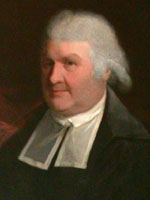Increase Sumner
| Increase Sumner | |
|---|---|

Portrait by John Johnston
|
|
| 5th Governor of Massachusetts | |
|
In office June 2, 1797 – June 7, 1799 |
|
| Lieutenant | Moses Gill |
| Preceded by | Samuel Adams |
| Succeeded by | Moses Gill (acting) |
| Associate Justice of the Massachusetts Supreme Judicial Court | |
|
In office 1782–1797 |
|
| Nominated by | John Hancock |
| Preceded by | James Sullivan |
| Succeeded by | Theophilus Bradbury |
| Personal details | |
| Born |
November 27, 1746 Roxbury, Province of Massachusetts Bay |
| Died | June 7, 1799 (aged 52) Roxbury, Massachusetts, United States |
| Political party | Federalist |
| Spouse(s) | Elizabeth Hyslop (m. 1779) |
| Alma mater | Harvard College |
| Signature | |
Increase Sumner (November 27, 1746 – June 7, 1799) was an American lawyer, jurist, and politician from Massachusetts. He was the fifth governor of Massachusetts, serving from 1797 to 1799. Trained as a lawyer, he served in the provisional government of Massachusetts during the American Revolutionary War, and was elected to the Confederation Congress in 1782. Appointed to the Massachusetts Supreme Judicial Court the same year, he served there as an associate justice until 1797.
He was elected governor of Massachusetts three times by wide margins, but died shortly after the start of his third term. His descendants include his son William H. Sumner, for whom the Sumner Tunnel in Boston, Massachusetts is named, and 20th-century diplomats Sumner Welles and Sumner Gerard.
Increase Sumner was born on November 27, 1746 in Roxbury, Province of Massachusetts Bay, one of eight children of Increase Sumner and Sarah Sharp. The elder Increase Sumner was a successful farmer descended from early settlers of Dorchester; he held a number of public offices including coroner for Suffolk County, and selectman of Roxbury.
In 1752 Sumner enrolled in the grammar school in Roxbury, now Roxbury Latin School, where the headmaster was William Cushing, future justice of the Supreme Court of the United States. Sumner excelled at school, and over the resistance of his father (who envisioned his son's future to be in agriculture) was enrolled at Harvard College in 1763. He graduated in 1767.
...
Wikipedia
